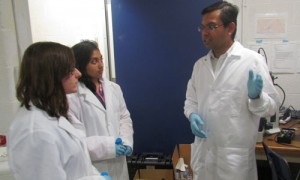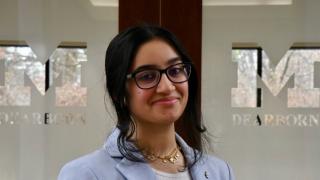
Another works on a collagen detection probe for the skin.
And a third is focused on culturing mesenchymal stem cells, working to optimize the protocol to preserve the cells for future use.
Think of it as the ultimate career test-driving experience. Students enrolled in Plymouth-Canton Community Schools’ STEM Academy are getting an in-depth look at life as an engineer thanks to the district’s partnership with University of Michigan-Dearborn’s College of Engineering and Computer Science (CECS).
Since August, the high school students have participated in lab activities with UM-Dearborn students. Bioengineering faculty members serve as mentors, while graduate students lead demonstrations in the lab.
“The notion that advanced research is only for the graduate students is fast changing,” said Nilay Chakraborty, assistant professor of mechanical engineering. “By exposing the high school students to advanced interdisciplinary research in a meaningful way we are creating a highly focused learning environment that fosters creativity and instills an interest for higher study in young minds.”
The lessons started small enough—wear gloves, show up on time. Soon after, though, they were observing the researchers in action and pitching in when they could.
The benefits of the program are evident: Students gain hands-on experience in a specific field. And with undergraduate and graduate students in the lab, high-schoolers can begin to chart out the next steps in their educational process, said Gargi Ghosh, assistant professor of mechanical engineering.
Joe Lo, for one, sees another benefit to the program—one that’s advantageous for both the university and the students involved. It’s a way to instill a love of research in students, especially if they can see results from their work down the line.
“I’m hoping they are able to get some results that help our graduate students contribute data to a problem that later on might lead to a publication,” said Lo, assistant professor of mechanical engineering. “I see this as a way to motivate high school students to go into engineering and science fields in college.”
CECS’ Extended Learning and Outreach Office (ELO) ran the program as a pilot throughout the fall semester after being approached by Danielle Ramos (’01 B.A., ’04, M.A.T). The STEM Academy leader was looking for a way to provide students with a real-world experience in a field of their interest.
“Now they are able to interact with professionals, experience the workplace firsthand and formulate future goals for a career within their pathway,” Ramos said.
Next on the agenda, the college is looking into restructuring as an intensive summer program. The shift will give students extra time in the lab to see results from their work.
“We’re thrilled that this innovative partnership with Plymouth-Canton STEM Academy is having such a positive impact on the Plymouth-Canton students, said ELO Director Jeanne Girard. “Our faculty and graduate students are also benefiting from the experience. It’s inspiring for all of us to see young people so intrigued with research and bio-engineering.”




